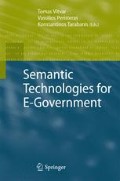Abstract
The LD-CAST project aims at developing a semantic cooperation and interoperability platform for the European Chambers of Commerce. Some of the key issues that this platform addresses are: The variety and number of different kinds of resources (i.e., business processes, concrete services) that concur to achieve a business service The diversity of cultural and procedural models emerging when composing articulated cross-country services The limited possibility of reusing similar services in different contexts (for instance, supporting the same service between different countries: an Italian–Romanian cooperation is different from an Italian–Polish one) The objective of the LD-CAST platform, and in particular of the semantic services provided therein, is to address the above problems with flexible solutions. We aim at introducing high levels of flexibility, both at the time of development of business processes and concrete services (i.e., operational services offered by service providers), with the possibility of dynamically binding c-services to the selected BP, according to user needs. To this end, an approach based on semantic services and a reference ontology has been proposed.
Access this chapter
Tax calculation will be finalised at checkout
Purchases are for personal use only
Notes
- 1.
In this application, the components of the OFV are not intended to be ordered. However, ordering the components of the OFV will allow a first level of relevance of the features, with respect to a single OFV to be expressed.
- 2.
- 3.
- 4.
We are currently analyzing possible other ways of assigning weights to the concepts of the ontology. For instance, considering the relative frequency of each concept with respect to the built OFVs.
- 5.
Note that the algebraic sign can be omitted in such rational expression
References
R. Akkiraju, J. Farrell, J. Miller, M. Nagarajan, M. Schmidt, A. Sheth, K. Verma, Web service semantics – WSDL-S (technical note), http://lsdis.cs.uga.edu/library/download/WSDL-S-V1.html, April 2005
ATHENA, D.A3.1, SoA on ontologies and the ontology authoring and management system, with ontology modelling language, ATHENA IP. Deliverable (2005)
T. Berners-Lee, J. Hendler, O. Lassila, The semantic web. Sci. Am. 284(5), 34–43 (2001)
A. De Nicola, R. Navigli, M. Missikoff, A software engineering approach to ontology building. Inform. Syst. 34(2), 258–275 (2009)
DSTC, IBM, Sandpiper software; Ontology definition metamodel, Revised submission to OMG, http://www.omg.org/docs/ad/05-01-01.pdf. Accessed 10 Jan 2005
W.B. Frakes, R. Baeza-Yates, Information Retrieval, Data Structure and Algorithms (Prentice Hall, Upper Saddle River, NJ, 1992)
T.R. Gruber, A translation approach to portable ontologies. Knowl. Acquis. 5(2), 199–220 (1993)
P. Jaccard, Bulletin del la Société Vaudoise des Sciences Naturelles 37, 241–272 (1901)
LD-CAST, D3.1. Common knowledge base specifications. Deliverable (2006)
D. Lin, in An Information-Theoretic Definition of Similarity, ed. by J.W. Shavlik. Proceedings of 15th the International Conference on Machine Learning, Madison, Wisconsin, USA (Morgan Kaufmann, San Francisco, 1998), pp. 296–304
Y.S. Maarek, D.M. Berry, G.E. Kaiser, An information retrieval approach for automatically constructing software libraries. IEEE Trans. Softw. Eng. 17(8), 800–813 (1991)
J. Madhavan, A.Y. Halevy, Composing mappings among data sources. VLDB J. 2003, 572–583 (2003)
A.G. Maguitman, F. Menczer, H. Roinestad, A. Vespignani, Algorithmic detection of semantic similarity. in Proceedings of WWW’05 Conference, May 2005, Chiba, Japan
M. Missikoff, F. Taglino, F. D’Antonio, Formalizing the OPAL eBusiness ontology design patterns with OWL. in Proceedings of IESA07, Madeira (Portugal) 26–27 March 2007
M. Missikoff, A. Formica, E. Pourabbas, F. Taglino, Weighted ontology for semantic search. in Proceedings of ODBASE08 (to appear), Monterrey, Mexico, 11–13 November 2008
OWL-S (Web Ontology Language for Web Service) 1.2 Release, http://www.ai.sri.com/daml/services/owl-s/1.2/
L. Rada, V. Mili, E. Bicknell, M. Bletter, Development and application of a metric on semantic nets. IEEE Trans. Syst. Man Cybern. 19(1), 17–30 (1989)
P. Resnik, Using information content to evaluate semantic similarity in a taxonomy. Proc. IJCAI 95(1), 448–453 (1995)
D. Roman, H. Lausen, U. Keller, D2v1.3. Web service modelling ontology (WSMO). Deliverable, http://www.wsmo.org/TR/d2/v1.3/, October 2006
C.E. Shannon, A mathematical theory of communication. BLTJ 27, 379–423, 623–656 (1948), http://mywikibiz.com/Semantic_tagging
Acknowledgments
We wish to address our warmest thankfulness to all the colleagues and partners of LD-Cast, since without their constructive cooperation these results would not have been achieved. In particular, we owe a special credit to Alessandra Catapano (ElsagDatamat) as the LD-CAST coordinator, to Antonio De Nicola (CNR-IASI) to Alessandro D’Atri and Paolo Spagnoletti (LUISS CeRSI), to Robert Woitsch and Vedran Hergovcic (BOC), to Nicola Christian Rinaldi and Valentina Di Michele (Retecamere).
Author information
Authors and Affiliations
Editor information
Editors and Affiliations
Rights and permissions
Copyright information
© 2010 Springer-Verlag Berlin Heidelberg
About this chapter
Cite this chapter
Missikoff, M., Taglino, F. (2010). A Semantic Cooperation and Interoperability Platform for the European Chambers of Commerce. In: Vitvar, T., Peristeras, V., Tarabanis, K. (eds) Semantic Technologies for E-Government. Springer, Berlin, Heidelberg. https://doi.org/10.1007/978-3-642-03507-4_6
Download citation
DOI: https://doi.org/10.1007/978-3-642-03507-4_6
Published:
Publisher Name: Springer, Berlin, Heidelberg
Print ISBN: 978-3-642-03506-7
Online ISBN: 978-3-642-03507-4
eBook Packages: Computer ScienceComputer Science (R0)

